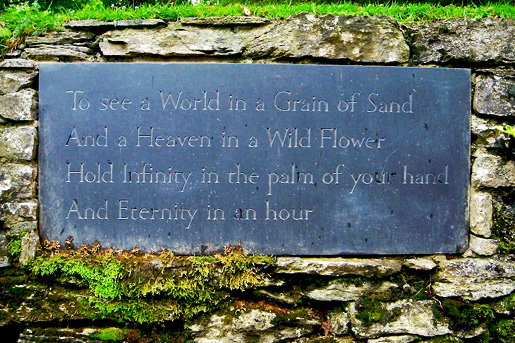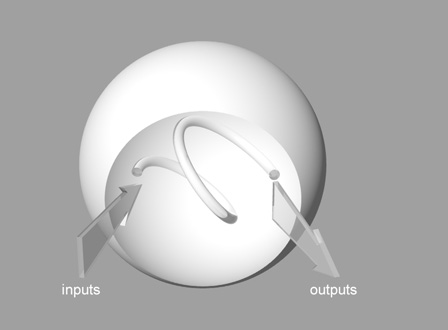The start of just another ‘perfect day’. We yawn, get up, stretch, go to the bathroom, use the toilet, brush our teeth, have a shower, get dressed, have some tea or coffee, a quick slice of toast and jam, glance at the news on the TV, and then set off to our college or work or school. But have you ever thought about why do we do these things (with individual variations, of course)? The small everyday actions that we make, often by habit, can reveal so much about the way we are as living beings. If we think about these first, then we can begin to sketch in some of the qualities that define life and living. After that, we shall be able to make more sense of the amazing hidden world of living things, the world that can only be revealed by microscopy and other special techniques…

“To see a World in a Grain of Sand,
And a Heaven in a Wild Flower,
Hold Infinity in the palm of your hand,
And Eternity in an hour.”
William Blake, Auguries of Innocence.
(photo - Dartington Hall Garden, Devon)

Let’s take a closer look at our morning ritual.
The yawn seems to energise us - our chest expands and life-giving air flows deeply into our lungs. Our thinking begins to clear and we complete the transition from sleep to alertness.
Then the toilet. We empty our bladder which has filled as we slept. The urine is warm, watery, usually pale yellow, and clear, although sometimes, let’s say after a night out, we notice our urine is darker in colour. It may have a perceptible odour. Sometimes we pass more, sometimes less, than the usual amount. Clearly, our body is getting rid of something here that it doesn’t need, and taking care to get rid of the right amount. We all know the uncomfortable feeling of having a full bladder, wanting to empty it, but not being in the right place to do it. The longer we have to subdue the urge, the more uncomfortable and ‘toxic’ we begin to feel. This reminds us how important this simple action is to normal health and wellbeing. Of course, babies don’t worry about this - to them unnecessary - etiquette and void their urine whenever they want. Also, while on the subject of visiting the toilet, isn’t it interesting how the food that goes into our mouth has all these nice colours and textures, and yet the faeces that come out at the other end are usually a rather uniform brown and of a similar consistency? Where have all the other colours and textures gone?
Then the ablutions - we feel more comfortable and worry less about our bodily odour after doing this - important considerations when living in an environment crowded with other people. If we lived in a remote area and rarely came into contact with other people, then perhaps we would feel less social pressure for personal hygiene. It is likely that our body would be quite capable of maintaining a reasonably healthy skin and mouth even then, although that would depend on the environmental conditions. The longest period that I have been without a bath or wash is about 3 weeks, the time it took to cross the Sahara from south to north. I can distinctly remember arriving in Tamanrasset, the first major habitation after the emptiness of the desert, and being strongly aware of the body odour of other people rather than ourselves…
Our skin provides us with a boundary - inside our skin is us, and outside is everything else. Now here is a thought - is that piece of toast and jam we have just swallowed for breakfast really inside us yet? We are certainly surrounding it now as it passes along our digestive tract, but can it be considered part of us either now or some time later?
Talking of food and drink - we have feelings of hunger and thirst, and perhaps even recognise a preference for something sweet or savoury before raiding the fridge or cupboard. Our body is telling us somehow that we need more fuel of a particular sort and more fluid to keep us going.
Lastly in our getting-up-in-the-morning scenario, we turn on the TV and quickly take in the news. In addition to the more material things like taking in air and food, we also need to know what is going on around us, and how it might fit with our understanding of the way the world works - our worldview. Of course as humans we also respond to things via touch and taste and smell, but the images and commentary coming via television have an especially powerful influence on our thinking and actions. If any of your friends are quick to say that TV has no effect on how we think - it only reflects modern society, then politely suggest they look at the effect of introducing satellite TV into the remote Himalayan kingdom of Bhutan a few years ago! We must not forget that communication is a two-way process - as well as taking information in, we also give information out by talking, writing text messages on our mobile and so on.
We can already make some worthwhile generalisations here. By looking at a small part of our daily activity, we can see the following pattern: we take some things in - food, liquid, information - and we pass other things out - urine, faeces, and information directed at others. In some way, these actions must be interconnected by processes occurring within our bodies. For example, there must be some connection between the food we take in and the faeces that emerge at the other end. There must also be some connection between feelings of thirst, the need to drink, and the need to void urine.
If we look at someone from the outside, including ourselves, it seems impossible to know what those processes are, and even if we introspect about what is going on inside us it still seems mysterious, rather like a beautiful smile in the dark. These processes that link our inputs with our outputs are within the domain known as metabolism - all the chemical processes that occur within the body.
We can represent the picture so far like this:
It’s almost as if there is a constant flow of matter, energy, and information passing through us, being changed as it does so. We are open systems, open to this flow, yet controlling it with precision… (For more about open systems, click here.)

Diagram of an open system
showing the boundary, inputs and outputs,
and the metabolic processes (spiral)
occurring within the system.

As we saw earlier, some definitions of life refer to the long history behind living things today. To biologists, this history is known as evolution. Not everyone accepts the evolutionary interpretation of the evidence we have - the fossils of ancestor forms, the geological evidence, and the genetic evidence - and have developed instead an explanation of the origin of life more in keeping with their religion or cultural mythology. It is an intriguing thought that even though evolutionary theory emerged within science, and has the support of most biologists, it is not testable in the way that most scientific ideas are meant to be testable. We were not around to watch it happening in the early stages, and we may never be in a position to recreate the starting conditions and see life unfold. There are plenty of speculations about how life began, and we do have evidence of evolutionary processes occurring now and in the very recent past (look at the diversity of dogs today - they all stem from an evolutionarily recent ancestor), so I believe it is fair to say that the circumstantial evidence supports the evolutionary interpretation.
We each have a personal history - not only for our own lifetime but also extending back through our parents and their parents before them. My history is different from yours - I was probably born at a different time and in a different place from you. My life experiences have been different. However, we have much in common, from the ability to share a common language right down to the stardust we are made of. And at this moment I am in the privileged position of being able to communicate with you as you read this text. Let’s take an imaginary journey back in time to see where we may have come from.
Next step...

